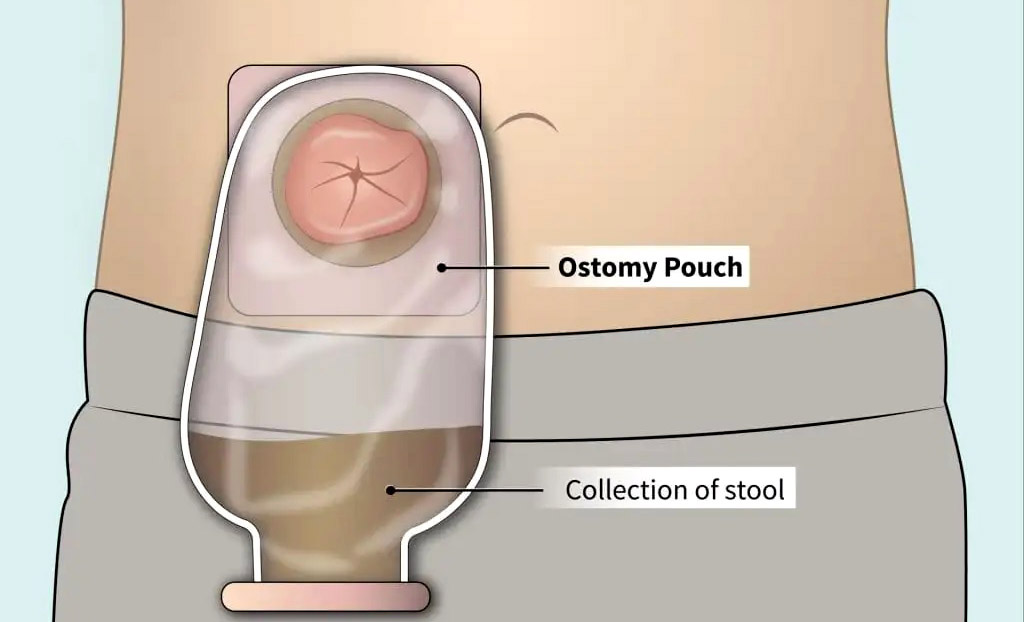AN OSTOMATE’S PERSPECTIVE
The ethical dilemma some surgeons in public healthcare face – save lives or prevent indignity and humiliation

Imagine being told that you have colorectal cancer, and your treatment plan includes diversionary surgery that will result in you having a stoma. This will be one of the most difficult moments in your life. But for thousands of patients the lack of care we experience in the public health system is making it even worse.
A stoma is an opening on the abdomen that can be connected to either your digestive or urinary system to allow waste (urine or faeces) to be diverted out of your body into a pouching system.
There are many reasons you may need a stoma. Common ones include bowel cancer, bladder cancer, inflammatory bowel disease (Crohn’s disease or ulcerative colitis), diverticulitis or an obstruction to the bladder or bowel.
Emotionally you are dealing with the trauma of having the dreaded CANCER and to top it off you are going to be “pooping” into a pouch for the rest of your life. The surgeon assures you that the cancer was caught early, and this course of action will save your life.
Your surgery is scheduled to take place at a public hospital. You wake after surgery and the reality sets in – there is a “bag of poop” attached to my side. This is my new normal. You are overwhelmed by all sorts of phobias.
Will I stink? Will my wife still accept me? My children, what will they think? Can I work?
And, and, and…
You are assured that you are not disabled, “in fact people are living normal, happy lives with the stoma”, you are told.
You start to calm down.
When discharge day comes you are discharged from hospital with three pouches, and told to come back to the stoma clinic the following week. Your first night at home and you wake up smelling faeces – you soiled yourself, your bedding, and the humiliation sets in. You change your pouching system (you have two left), clean your bedding and try to get some sleep again, only you don’t, because you are afraid that this will happen again.
You resort to plastic bags and Sellotape in the interim while you wait to get to the clinic.
Your mind is going to all sorts of dark places. Was this surgery the right thing to do? Look what just happened.
Day two at home and you are exhausted from lack of sleep. You become cranky, miserable and you break down crying. You are still humiliated. Around lunch time, you get that “shitty smell”, you look down and your clothes are soiled.
What the hell is going on?! Your pouching system is leaking. In fact, the pouch is not staying stuck to your body.
You have to change again, but now you only have one left. You panic!

Ostomy pouch. (Image: Supplied)
You call the stoma clinic you are supposed to go to the following week and explain to them what has happened.
The response? “I’m sorry, we don’t have any more pouches, come next week.”
What the hell am I supposed to do?
Now, along with the depression creeping in, you are also filled with anxiety. What am I going to do until next week? There are still four days to go until I get to the clinic. Three pouches did not last a day, how am I going to make this last one last four days?
Your supportive partner gets creative and uses Elastoplast to help the pouch’s base to stick to the body. You feel a little better. Sadly you leak again!
You feel like a baby who has no control over their bowel function. The reality is you do not have this bowel control any longer as this surgery has left you incontinent, so you no longer have the ability to hold and/or squeeze, that urge you used to get when you needed the toilet. In fact, you no longer get that “urge to go”, you just go and are none the wiser.
You are in a crisis, you have no more pouches. Desperate, you get taken to the stoma clinic for help. The nurse has two pouches for you and says come back in a few days.
These patients now go through life humiliated, isolated from loved ones, avoiding people and places to try and avoid being embarrassed.
These pouches are not working. They are also leaking. You research on Google – this brand that was given is supposedly of superior quality.
What the hell is going on here?
You resort to plastic bags and Sellotape in the interim while you wait to get to the clinic. The problem though is that you reek of faeces! You are soiling yourself consistently because this plastic and Sellotape cannot form the seal you need.
You eventually get to the clinic and are told, “sorry, we do not have any pouches for you”. That’s it, that’s the straw that broke the camel’s back. You break down, in tears, humiliated and isolated from your loved ones because you “stink of shit all the time”.
Today is the first day you contemplate ending it all.
Surely this was not the life-saving surgery the surgeon promised?
The reality faced by many
This story may sound like a horror movie, but it is the reality for so many South Africans across the country who are in the public healthcare system.
Sadly, in the scenario above, the leaks and humiliation were not because of defective or inferior-quality products. It was because the patient was given the incorrect pouching system. These patients now go through life humiliated, isolated from loved ones, avoiding people and places to try and avoid being embarrassed, and ultimately, they are unnecessarily debilitated.
In some instances, these ostomates contemplate, and sadly some follow through with, suicidal thoughts.
This horror story could have been avoided had the following happened:
- A suitably qualified stoma therapist scripted the ostomate with the correct pouching system. There is no one-size-fits-all pouch. Pouches, like a prosthetic limb, are put together with the individual patient’s lifestyle and body type in mind; and
- The procurement policy and process hindering the pouching prescription acquisitions are made patient-sensitive. There is no one-size-fits-all approach: needs and prescriptions are based on the individual’s body type, age, lifestyle, disease type, to name but a few. How do you request three quotes to look for the cheapest alternative?
So, here is the ethical dilemma that surgeons in the public healthcare system face.
“Would it have been more humane for the patient in the scenario above to have died from the cancer rather than suffer the humiliation and indignity of constantly soiling themselves because there is no after-surgery care for this patient?”
We hear about this choice often when it comes to cancer treatment, in particular chemotherapy. The chemo may be too aggressive and may impact the quality of life that that patient is left with.
The surgeons offering these diversionary surgeries as a treatment option are 100% correct that it is life-saving and in some cases, such as Crohn’s disease, life-changing.
However, the lack of care and support after surgery is debilitating the ostomate and stripping them of their dignity.
So, we ask: is it worth having these surgeries performed for the sake of saving a life, if our quality of life will be severely compromised?
The answer may still be yes, but it’s a harsh choice to expect a patient to make. DM
Faizel Jacobs is a father, husband, cancer survivor and an ostomate. Before being diagnosed with colorectal cancer in 2016, he thrived in the corporate space as customer service/team manager for more than 20 years. After being diagnosed he was left with a permanent colostomy or stoma. A stoma is formed via a surgical procedure that creates an opening in the body for the discharge of bodily waste.
Jacobs says: “My experience has shown me that there was a serious lack of education on living with the stoma/ostomy which was impacting on the physical and mental well-being of ostomy patients across the country.”
He started using his own experiences to raise awareness about the challenges and to promote greater understanding and support for this community. In June 2020, along with other ostomates, he formed the nonprofit South African Society of Ostomates, which provides information, education and support to people who have had ostomy surgery and engages in activism and advocacy to ensure the rights to access healthcare services for ostomates are met with dignity and care.



















Your remarkable Faizel. Good for you for using your extraordinarily difficult experience to help others.
Thank you for your kind words Nic
This NGO has really helped a lot of people, with such support and knowing that one is not alone, brings comfort to fellow stoma members. True there’s a lot of lack of education as seeing in the group, few hospitals offer stoma patients on how to care and clean the stoma. I’m from private hospital, hence the experience is totally different from government hospitals, I can imagine what everyone has gone or goes through. But with support, it makes it easier.
Thank Faizel, came to know about this group in 2020 when my stoma bags where delivered to my house and asked if was interested to join such group. I don’t regret it, it’s an eye opener to see so many sufferings just survive, worse with bags sold at expensive price of which not everyone can afford.
My wish is if the SASS can grow to a point of raising funds to help those who can afford to buy bags than just being a support group. I’m sure with time it would be possible.
I am so pleased to hear that you found comfort and learning from our community. And yes, we hope that as we grow we are able to support many more ostomates within our community and ultimately not having a single ostomate struggle to have access to what is our new toilet.